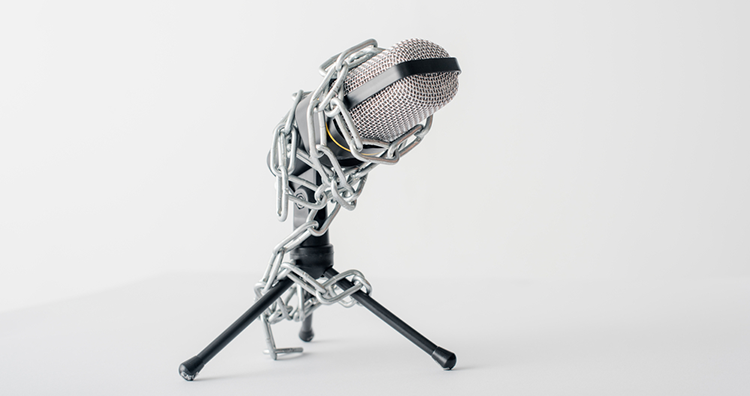SCOTUS Rules Students Have Standing to Bring Free Speech Suit

In Uzuegbunam v. Preczewski, 592 U.S. ____ (2021), the U.S. Supreme Court held that two students had standing to sue their college for violating their free speech rights, even though their suit sought only nominal damages. According to the Court, a request for nominal damages satisfies the redressability element necessary for Article III standing where a plaintiff’s claim is based on a completed violation of a legal right.
Facts of the Case
The suit was brough by former students at Georgia Gwinnett College who wished to exercise their religion by sharing their faith on campus while enrolled there. In 2016, Chike Uzuegbunam talked with interested students and handed out religious literature on campus grounds. Uzuegbunam stopped after a campus police officer informed him that campus policy prohibited distributing written religious materials outside areas designated for that purpose. A college official later explained to Uzuegbunam that he could speak about his religion or distribute materials only in two designated speech areas on campus, and even then only after securing a permit. But when Uzuegbunam obtained the required permit and tried to speak in a free speech zone, a campus police officer again asked him to stop, this time saying that people had complained about his speech.
Campus policy at that time prohibited using the free speech zone to say anything that “disturbs the peace and/or comfort of person(s).” The officer told Uzuegbunam that his speech violated campus policy because it had led to complaints, and the officer threatened Uzuegbunam with disciplinary action if he continued. Uzuegbunam again complied with the order to stop speaking.
Another student who shares Uzuegbunam’s faith, Joseph Bradford, decided not to speak about religion because of these events. Both Uzuegbunam and Bradford sued certain college officials charged with enforcement of the college’s speech policies, arguing that these policies violated the First Amendment. The students sought injunctive relief and nominal damages. The college officials ultimately chose to discontinue the challenged policies rather than to defend them, and they sought dismissal on the ground that the policy change left the students without standing to sue. The parties agreed that the policy change rendered the students’ request for injunctive relief moot, but disputed whether the students had standing to maintain the suit based on their remaining claim for nominal damages. The Eleventh Circuit Court of Appeals held that while a request for nominal damages can sometimes save a case from mootness, such as where a person pleads but fails to prove an amount of compensatory damages, the students’ plea for nominal damages alone could not by itself establish standing.
Supreme Court’s Decision
By a vote of 8-1, the Supreme Court reversed. “This case asks whether an award of nominal damages by itself can redress a past injury. We hold that it can,” Justice Clarence wrote on behalf of the majority.
As Justice Thomas explained, to establish Article III standing, the Constitution requires a plaintiff to identify an injury in fact that is fairly traceable to the challenged conduct and to seek a remedy likely to redress that injury. To determine whether nominal damages can redress a past injury, the Court looked to common law, noting that the prevailing rule at common law was that a party whose rights are invaded can always recover nominal damages without furnishing evidence of actual damage. “Because nominal damages were available at common law in analogous circumstances, we conclude that a request for nominal damages satisfies the redressability element of standing where a plaintiff’s claim is based on a completed violation of a legal right,” Justice Thomas wrote.
While the Court acknowledged that “a single dollar often cannot provide full redress,” it found that “to effectuate a partial remedy satisfies the redressability requirement.” It further concluded that a contrary rule would result in “the oddity of privileging small-dollar economic rights over important, but not easily quantifiable, nonpecuniary rights.”
In reaching its decision, the Court rejected the argument that compensatory damages is a prerequisite to an award of nominal damages. As Justice Thomas explained, “[n]ominal damages are not a consolation prize for the plaintiff who pleads, but fails to prove compensatory damages. They are instead the damages awarded by default until the plaintiff establishes entitlement to some other form of damages, such as compensatory or statutory damages.”
Previous Articles
SCOTUS Decision in Bowe v. United States Is First of the 2026 Term
by DONALD SCARINCI on February 5, 2026
In Bowe v. United States, 607 U.S. ___ (2026), the U.S. Supreme Court held that Title 28 U.S.C. § ...
SCOTUS Rules State Can’t Immunize Parties from Federal Civil Liability
by DONALD SCARINCI on January 29, 2026
In John Doe v. Dynamic Physical Therapy, LLC, 607 U.S. ____ (2025) the U.S. Supreme Court held that...
Supreme Court to Address Racial Discrimination in Jury Selection
by DONALD SCARINCI onWhile the U.S. Supreme Court has concluded oral arguments for the year, it continues to add cases t...
The Amendments
-
Amendment1
- Establishment ClauseFree Exercise Clause
- Freedom of Speech
- Freedoms of Press
- Freedom of Assembly, and Petitition
-
Amendment2
- The Right to Bear Arms
-
Amendment4
- Unreasonable Searches and Seizures
-
Amendment5
- Due Process
- Eminent Domain
- Rights of Criminal Defendants
Preamble to the Bill of Rights
Congress of the United States begun and held at the City of New-York, on Wednesday the fourth of March, one thousand seven hundred and eighty nine.
THE Conventions of a number of the States, having at the time of their adopting the Constitution, expressed a desire, in order to prevent misconstruction or abuse of its powers, that further declaratory and restrictive clauses should be added: And as extending the ground of public confidence in the Government, will best ensure the beneficent ends of its institution.





